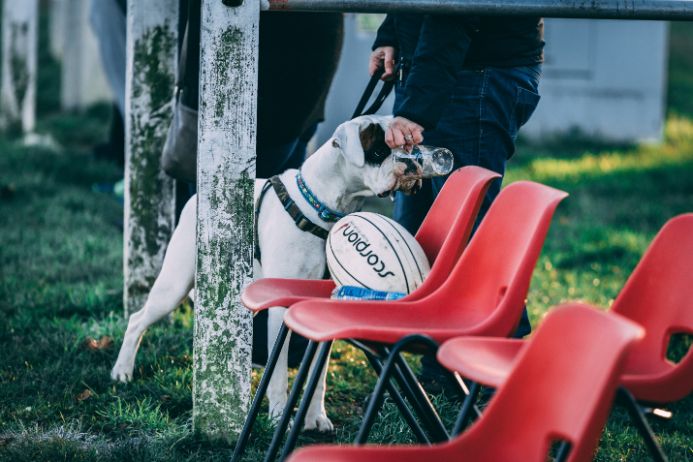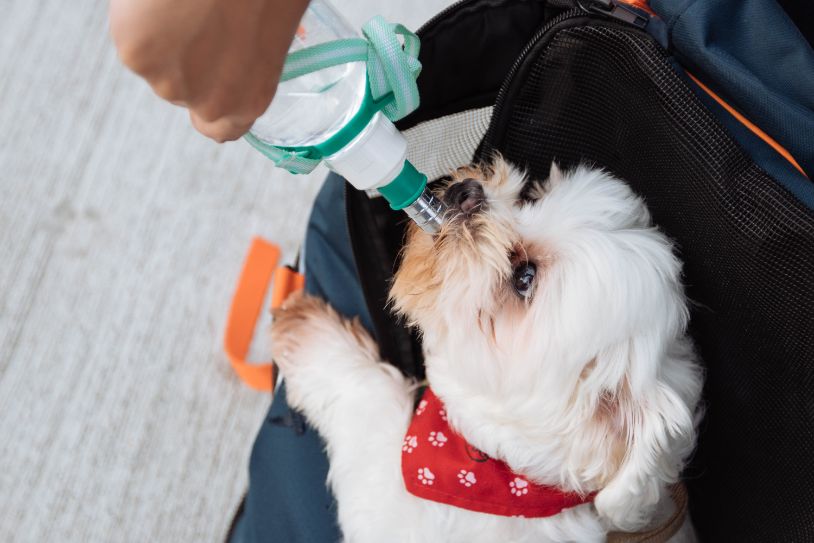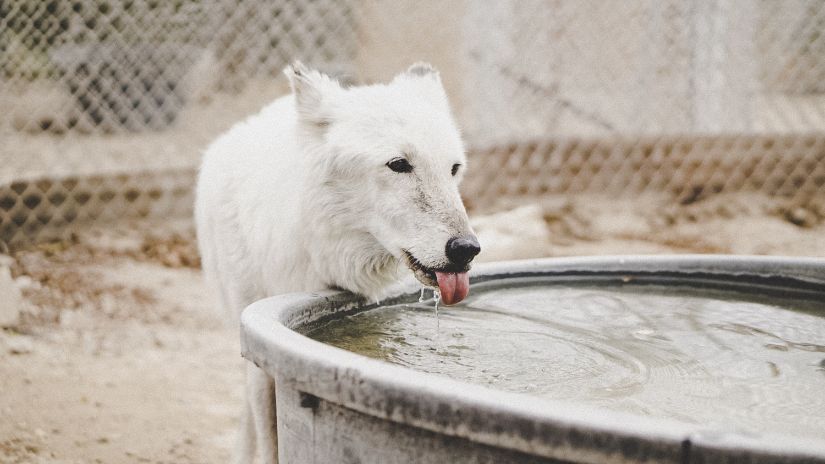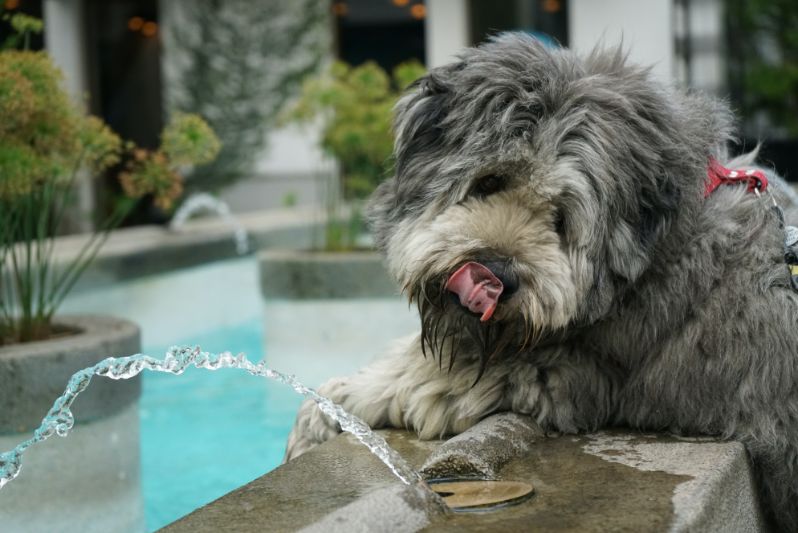Have you suddenly noticed your dog drinking a lot of water? We’ll explain the causes of your dog’s excessive drinking and any associated issues below, so don’t worry.
Being thirsty is the most basic reason that either humans or animals drink. They need to drink to replenish the water that is being lost from their body. Dogs pant to release body heat because they don’t sweat, aside from what happens on their nose and foot pads.
They lose water through evaporation when they pant frequently. Drinking water can quickly restore this physiologic water loss. These more typical medical conditions listed below for excessive thirst in dogs may be examined by your veterinarian.
Why Does My Puppy Drink a Lot of Water?
There may be a number of causes for a puppy to appear to drink more water than usual.
Diabetes Mellitus
Both insulin deficiency and insulin resistance contribute to diabetes mellitus’ high blood sugar levels. The kidneys excrete extra blood sugar into urine, which carries water with it. Here, frequent urination in dogs can result in frequent thirst. Changing the dog’s diet and giving him insulin are two ways to treat diabetes mellitus.
Kidney Disease
It’s possible for dogs with kidney issues to have diluted urine. Because they urinate more frequently, they need to consume more fluids to stay hydrated. Changing the dog’s diet and addressing any underlying causes of kidney failure, such as kidney infections or stones, are ways to treat kidney disease in dogs.
Cushing’s Syndrome

When the adrenal gland produces too much cortisol, either as a result of an adrenal tumor or a pituitary tumor, Cushing’s syndrome is the result. Cortisol in excess causes thirst to increase, which causes urination to increase.
Surgery or medication may be used to treat Cushing’s syndrome depending on where the tumor is located.
Diarrhea Or Vomiting
Any dog experiencing diarrhea or vomiting will lose body fluids. Canines that have recently experienced vomiting, diarrhea, or both may drink more than usual to prevent dehydration.
Pyometra
An infected uterus is known medically as a pyometra. Only female dogs who haven’t had their sex removed experience this condition. Pyometra is a potentially fatal condition that needs immediate surgical intervention, antibiotics, and intravenous fluid therapy to rehydrate the patient.
Other Causes of Excessive Thirst in Dogs
A few other reasons your dog may have excessive thirst include:
- Dehydration
- Liver disease
- Cancer
- Infection
- Fever
- Medications, including steroids and diuretics
- Heatstroke or hyperthermia
- Diabetes insipidus
- Hyperthyroidism
- Parasites
- Hypercalcemia
Depending on the underlying cause in each of these situations, different treatments are used.
Why is Water So Important for Puppies?
Water aids in all aspects of metabolism, including breathing, brain function, and blood flow. As it circulates through your dog’s body, blood, which is primarily made of water, removes dangerous toxins and carries oxygen. This exchange cannot occur without water, which could be harmful to important organs.
Additionally, water controls your puppy’s body temperature. Your dog might pant in hot weather. By releasing water through evaporation, panting helps a dog stay cool. He may need to consume more water than usual, though, as he is losing water through his tongue.
How Much Water Intake is Normal in a Healthy Dog?

Usually, diet will have some effect on water intake. While dogs fed dry food or salty treats must make up for their water intake and may drink more than they should, dogs fed wet food may drink less. However, physiologically speaking, this water intake is still normal.
| Puppy Weight | Normal Water Intake Per Day |
| 5 pounds | 3-5 ounces |
| 10 pounds | 5-10 ounces |
| 12 pounds | 6-12 ounces |
| 15 pounds | 12-15 ounces |
| 20 pounds | 16-20 ounces |
A healthy dog should consume between 20 and 70 ml per kilogram per day, which is a good general rule of thumb. Knowing how much water your dog consumes is crucial because excessive water consumption can be a sign of organ disease while insufficient water consumption can cause dehydration.
Your dog will likely urinate more frequently if he drinks more, which is another indication of a potential issue. Increased intake actually frequently occurs as a result of excessive urine fluid loss.
Your dog may be losing too much water for any number of reasons if he is drinking excessively (polydipsia). The most prevalent of these illnesses are kidney failure, diabetes mellitus, and Cushing’s disease. A number of diseases also cause excessive water intake and urine output.
Psychogenic polydipsia is a rare reason why dogs drink more. It is a behavioral condition marked by excessive thirst as a physical symptom.
Primary polydipsia is the term used to describe excessive water consumption that is not caused by illness or psychosis. For example, water-loving breeds or bored puppies may consistently or sporadically drink excessive amounts of water.
Your veterinarian may have a difficult time sorting these out. An increased need for water is a common side effect of some medications, like cortical steroids.

Your Puppy’s Water Intake During Housetraining
During the house-training process, the water rules are slightly altered. It’s best to take your puppy’s water bowl out at night. The same way you should be consistent with feeding times, so should your water removal schedule.
As a general rule, take away the food and water dishes two to three hours before bedtime. This means that if your lights-out time is at 11 p.m., a puppy should have no food or water after about 8–8:30 p.m.
This allows you to take him outside for one last bathroom break before turning in for the evening.
By limiting your dog’s access to water during the day, you must be careful not to abuse this advice. Due to their greater thirst than adult dogs, puppies are more susceptible to dehydration.
Limiting water intake may also cause compulsive actions like resource guarding. Giving your puppy his regular amount of water throughout the day is therefore important, even while housetraining.
Get Help When You Need It
Please do not deprive your puppy of water if it appears that they are drinking excessive amounts or are having trouble potty training. If an underlying disease process is causing excessive drinking, water deprivation can be very dangerous for a puppy.
Determine your average daily water intake over the course of three to five days, then get in touch with your veterinarian for more information.





